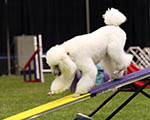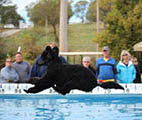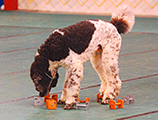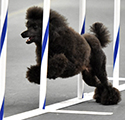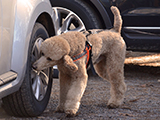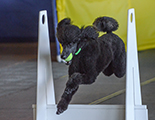
Dedicated to the Health, Education, and Performance of Poodles

Dedicated to the Health, Education, and Performance of Poodles
Therapy dogs are used to benefit the physical and/or emotional well-being of people. Generally, Animal Assisted Therapy is supervised by a health professional to augment physical therapy for a patient, while Animal Assisted Activity involves volunteers sharing their dogs with various populations to benefit their emotional health.
There are myriad opportunities for sharing your therapy dog and brightening the lives of others. Therapy dogs may visit nursing homes, hospitals, schools or institutions with confined or disabled patients. It is well-established that petting a dog can lower blood pressure and reduce stress. Often, a withdrawn person will begin his first “return to contact” by smiling at a dog or reaching out to pet one. The interaction with the animal is non-threatening and the dog is non-judgmental, which can encourage a patient to begin to interact with a living being. A therapy dog often initiates the first smile seen in many months on the face of a nursing home resident.
In other settings, interaction with a dog can be a reward for good behavior from an autistic or developmentally disabled child. Therapy dogs and their handlers can also volunteer in programs that have children read aloud to a dog, either at school or a public library. The child has an attentive, non-judgmental audience in the dog which is a great way to build confidence and proficiency in reading.
A therapy dog must be gentle and under control at all times and should possess an affable temperament. He must be able to handle strange voices, loud noises, erratic movements, wheelchairs or other medical equipment with aplomb. He must also be calm around other dogs. If he knows a few tricks, they can be a great ice breaker for people who may be reluctant at first to interact with a dog.
There are three major national organizations that test and register therapy dogs, Therapy Dogs International, Inc. (TDI), The Delta Society (through their Pet Partners program) and Therapy Dogs, Inc. Both the Delta Society and TDI, Inc. are international organizations. Therapy Dogs, Inc. serves the U.S. and its territories, Canada and Puerto Rico. All three organizations require that the dog be tested and evaluated by one of their evaluators in order to ensure that the dog has a temperament suited to therapy work.
Many all-breed and obedience clubs have a group of people who meet regularly to organize and make therapy visits. If there are no organized groups in your area to contact, you may be able to locate facilities that welcome individual visits by trained dogs. The three main therapy dog organizations carry liability insurance for their registered dogs, so if you visit on your own, check your homeowner’s insurance carrier to make sure you have coverage in the event of any accidents.
AKC recognizes therapy dogs with 5 levels of titles, based on the number of recorded and documented visits. AKC does not certify the dogs; they must be certified by an AKC recognized therapy dog organization, listed at http://www.akc.org/events/title-recognition-program/therapy/organizations/.
Therapy Dog participation is one of the several areas from which points can be accumulated to achieve the VIP Versatility Certificate or Versatility Certificate Excellent or Versatility Certificate Master award.
To learn more about all things Poodle, and to support health research for this wonderful breed, please consider becoming a member of VIP.
Websites change frequently so if you find that one of these links is not working, please notify the webmaster. Thank you; we appreciate your help keeping our website up to date!
Links to other web sites offer opportunities to find further information on related subjects and are provided to assist you in locating information. Please note that by clicking on these links you will leave the Versatility in Poodles website and enter websites not created, operated, or maintained by VIP. Any links to external Web sites are provided as a courtesy. They should not be construed as an endorsement by Versatility in Poodles of the content, products, services, policies or views of the linked materials, nor is VIP responsible for the accuracy, reliability, or timeliness of information contained in the linked materials.

